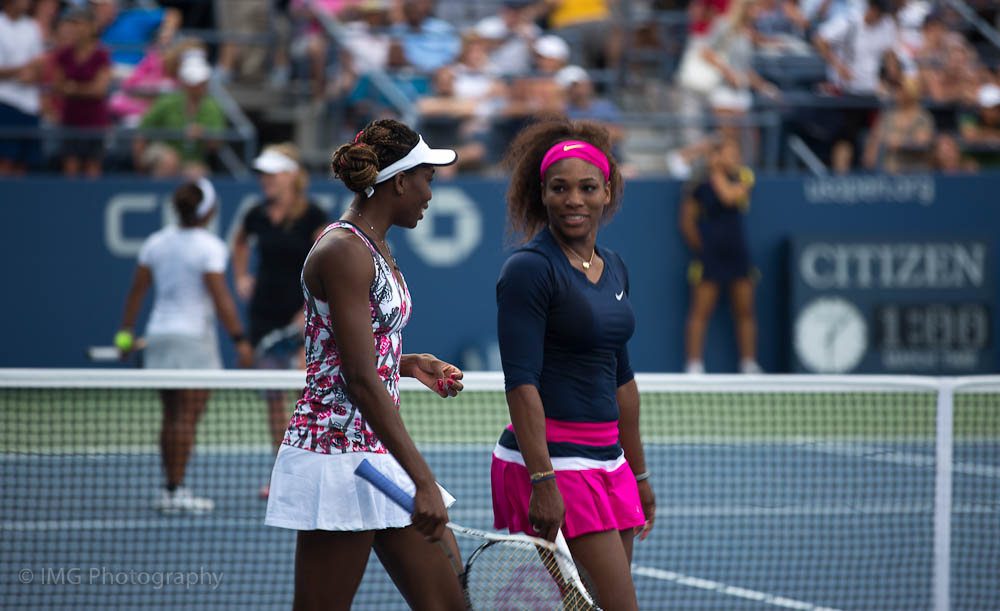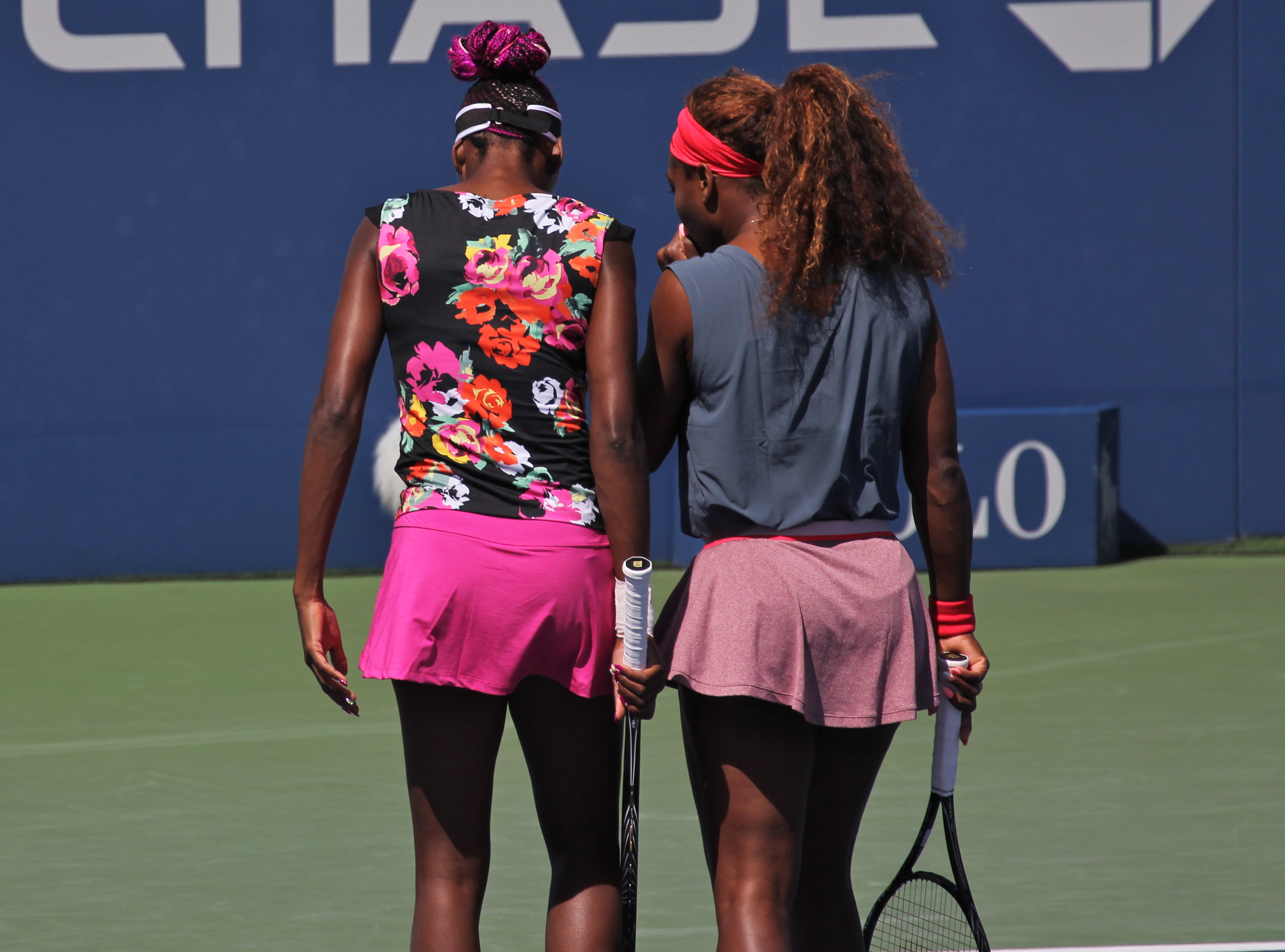
It ended with “the hug.” At least that’s what the Twitterverse dubbed the supportive embrace the Williams sisters shared after their ginormous tennis match in New York.
Thousands of miles away, I let out a sigh of relief.
Serena just beat her big sister, Venus, in the U.S. Open semifinals, a duel billed by one media outlet as one of the most historic and awkward rivalries in sports, older sister Venus a roadblock in the way of her junior sibling’s march toward sports history as Serena edged closer to a calendar year Grand Slam.
I couldn’t help but track this sports story with my parenting lenses on, those night-vision goggles that might illuminate things otherwise hidden to me. How could these sisters gracefully compete in the grandest of spectacles when my own children can’t play pick-up basketball in the driveway without fighting and someone storming off mad?
But it’s more than that. As parents of multiple children, many of us wonder how much to manage sibling rivalries on the sports fields. Real rivalries — not routine bickering but the sports kind where young athletes’ identities are interwoven in their sport. Competition is usually a good thing, but is there a point where it undermines the foundation of a sibling relationship? Should we guide them into different sports so as to encourage their individuality, even if they both love whacking a baseball? Do we hold back on our enthusiasm for a kid who’s talented while the other may struggle?
ESPN’s Peter Bodo writes, “There is a big difference between competing with a sibling indirectly … and facing off, across the net, in a one-on-one struggle that produces a clear result.” No question, the head-to-head competition is the trickiest. But as a mother with three kids, two of whom will be competing on the same high school team this fall, I would argue even the indirect competition can make parents feel like they are walking on eggshells.
For a time, my husband and I had it easy. Our youngest son loved lacrosse, our middle son was our soccer player, and our oldest son was the distance runner. Each had their place in the family and a distinguishing skill set we could mention in our Christmas letters. Then, for a number of reasons, soccer lost its luster for the middle son. He realized that he, too, could run fast. He ran a 5:09 mile as an eighth grader, which ooops, happened to be faster than his older brother’s time at that age. I cheered loudly but will admit to a sinking feeling. What now?

I hit the books to research sibling rivalries and found advice such as: “Encourage win-win negotiations, where each side gains something.” Well, the nature of sports is that someone wins and someone loses so that’s not helpful. I read, “Help structure the problem-solving.” Again, in sports, the race course, field or court is the structure. How about the tip to “teach conflict resolution skills.” The whole point of sports is resolving conflict by being faster, a better thrower, hitter, whatever, end of story.
My friend Susie has it tougher. Her two daughters are one grade apart. Her youngest daughter made the high school varsity soccer team as a freshman, her sophomore daughter made junior varsity. It wasn’t a total surprise; the younger one, Jackie, had been playing the higher-level club soccer for years while Jesse had left club to come back and play on the local select team. “We knew this could happen,” Susie says.
The first day of high school also happened to be a game day. The family woke up to a spirit sign in their yard for Jackie, who also got to wear her varsity shirt to school. “When I saw that sign, my first thought was ‘shoot’ for Jesse, but at the same time, I’m like ‘yeah!’ for Jackie.”
Eggshells. More-valuable-than-Fabergé eggshells. But Susie said an important thing that stuck with me. When tryouts were happening, she had told her younger daughter, who is compassionate and sensitive, “Don’t hold back, don’t feel like you have to slow down, do your own tryouts and whatever happens, happens.”
Which sounds a lot like what I read in, Siblings Without Rivalry: How to Help Your Children Live Together So You Can Live Too by Adele Faber and Elaine Mazlish. Focus on each child’s needs rather than how their needs compare to their siblings, what Faber and Mazlish call The Perils of Comparisons. “Instead of comparing one child favorably to another, speak only about the behavior that pleases you.”
More than rivalry, the word used almost as frequently throughout the Williams sisters’ U.S Open semifinal match was a different “R” word; respect. It’s what has allowed these two elite athletes to compete at the very highest level yet be BFF’s and each other’s biggest supporters.
Besides working on improving her own soccer skills, Jesse has a lot of other things going for her: a successful business week camp at Gonzaga University, her Young Life Christian faith group, and in the past few months she has gotten involved in an organization of high school girls helping other girls in Africa. “Children don’t need to be treated equally,” Faber and Mazlish write. “They need to be treated uniquely.” Writers who follow the Williams’ sisters describe what different people they have become: Venus a spokeswoman for equality for female athletes and Serena a businesswoman taking on celebrity status and hanging with the likes of Kim Kardashian.
Post-game, post-match, post-race, we parents — aka cheerleaders — should focus on what each of our athletes did well. Did one show extraordinary leadership on the field? Did one shoot the soccer ball well with her left foot, something she hadn’t before in a game? Did one have great kick at the end of the race to run his own personal record?
What we’re trying to do is build each child’s confidence in themselves. Even if it’s through set-backs or failures — after all, those can be the best learning opportunities. To paraphrase Seattle Seahawks head coach Pete Carroll in his book, Win Forever: Live, Work, and Play Like a Champion, athletes shouldn’t view the competition as the enemy, rather view it as the opportunity to perform at the athlete’s own highest level.
Here’s another reminder for parents: It’s not about us. In Changing the Game: The Parent’s Guide to Raising Happy, High-Performing Athletes and Giving Youth Sports Back to Our Kids, John O’Sullivan writes that parents should shift the paradigm from “How can I change my kid” to “How can I change so that I can be the best parent for my child, and my child can perform his best?”
More than rivalry, the word used almost as frequently throughout the Williams sisters’ U.S Open semifinal match was a different “R” word; respect. It’s what has allowed these two elite athletes to compete at the very highest level yet be BFF’s and each other’s biggest supporters.
I’m envisioning a sequel to this summer’s hit movie Inside Out, where maybe instead of Disgust, screenwriters will incorporate Respect as a feeling that’s stored at Headquarters, inside marbles that look like tennis, soccer or basketballs. And instead of a young girl from the Midwest, the protagonists will be two young African American girls from Compton.











